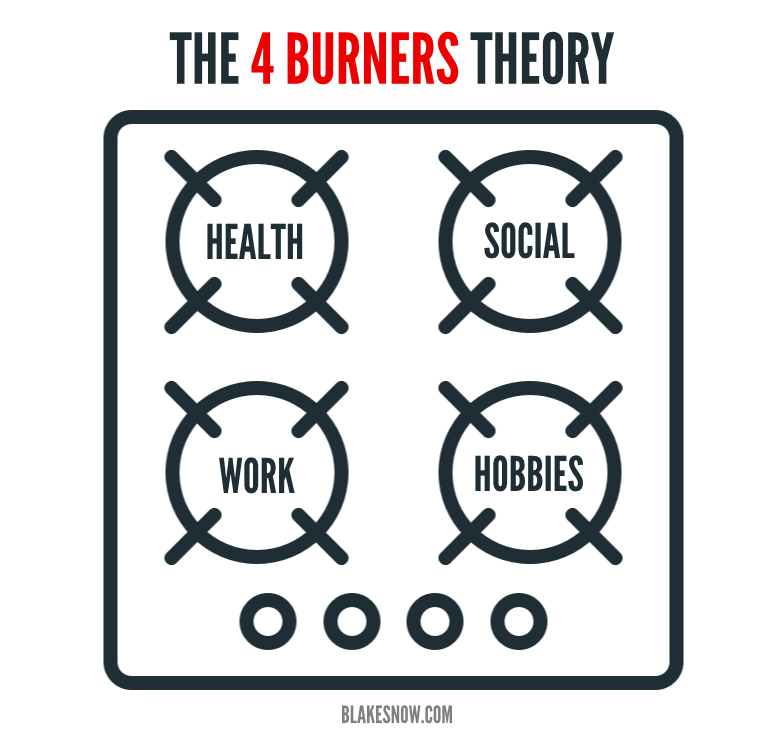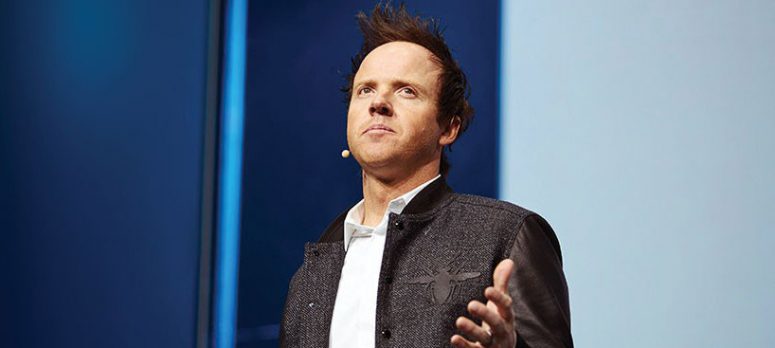I’m a big believer in the four burners theory, which I first endorsed in Log Off: How to Stay Connected after Disconnecting.
Here’s how I explained the idea in chapter 7: “Of all the research I’ve reviewed over the last decade, The Four Burners Theory is the leading cause of dying with regret. The theory argues that an individual’s life can be divided into four quadrants, or “burners,” of a conventional stove: family, friends, health, and work. “In order to be successful you have to cut off one of your burners,” the theory states. “And in order to be really successful you have to cut off two.”

But since publishing the book, I’ve slightly updated the more traditional definition of the four burners. I do this by merging friends and family into a single “social” category, which many people already do, while adding “hobbies,” which is a huge area that humans devote time to. In that way, the updated burners cover all of your bases.
The same gas limits still apply, of course. If you want to be iconic at the expense of others, pick just one and jack up the heat (think: Steve Jobs). If you want to be great, pick only two burners and run ’em hot. If you want to be good, pick three burners and cook moderately. If you want to be well-rounded and multi-dimensional, slow burn all four.
The choice is yours. 🔥

Rescue Time recently published a data-filled article on improving focus in a restricted world that’s still sorting itself out. Although their recommendations (below) aren’t applicable to everyone, the following five certainly are:
- Develop an ‘indifferent’ attitude to the things you can’t change
- Deprioritize tasks that are bringing you stress without any return
- Rebuild your passion and curiosity after burning out
- Use the ‘scientific method’ to find your ideal working habits
- Create hard boundaries on excessive emails, all-day Zoom calls, and late-night work
I learned the first lesson in anger management. Spoiler alert: this really works and has enabled me to let go of my anger associated with what I believe to be draconian restrictions. The last point I learned while developing my first book. The better boundaries we set, the better we’re able to nurture all of our talents and needs.
As for the rest, I highly recommend you try them, namely quitting habits that aren’t doing anything for you, trying new things when your old routine no longer works, and trying new approaches to your work before giving up or keeping the ones that have a positive impact.

Wikimedia Commons
PROVO, Ut. — Want to get ahead in this world? Work lots of extra hours — even nights and weekends — experts say, and it will all be worth your while.
“It’s easy to forget what’s most important in life,” says Bill Loney, a certified life coach who hasn’t quite made it in life yet. “Family, friends, and social activities that can often inspire and enrich the life of an individual… these are all distractions in getting more work done,” he adds.
Emma Royds, who hasn’t stopped looking at her smartphone every five minutes for three straight years, councils that most people actually die wishing they had spent more time — not less — working. “People never regret working too much,” she says. “My neighbor opted to do adventurous, social, and fitness-related activities with family and friends in his spare time.
“Now 80, he told me recently he really wishes he would have spent more time on TPS cover sheets, obsessively trying to turn his company into the next big thing, and reading email during every waking hour of his life. It’s kind of sad, really.” Continue reading…

I recently enjoyed this commencement speech by Ryan Smith and hope you do too. It’s sweat advice on being “all in” in work, family, and our underlying beliefs.




